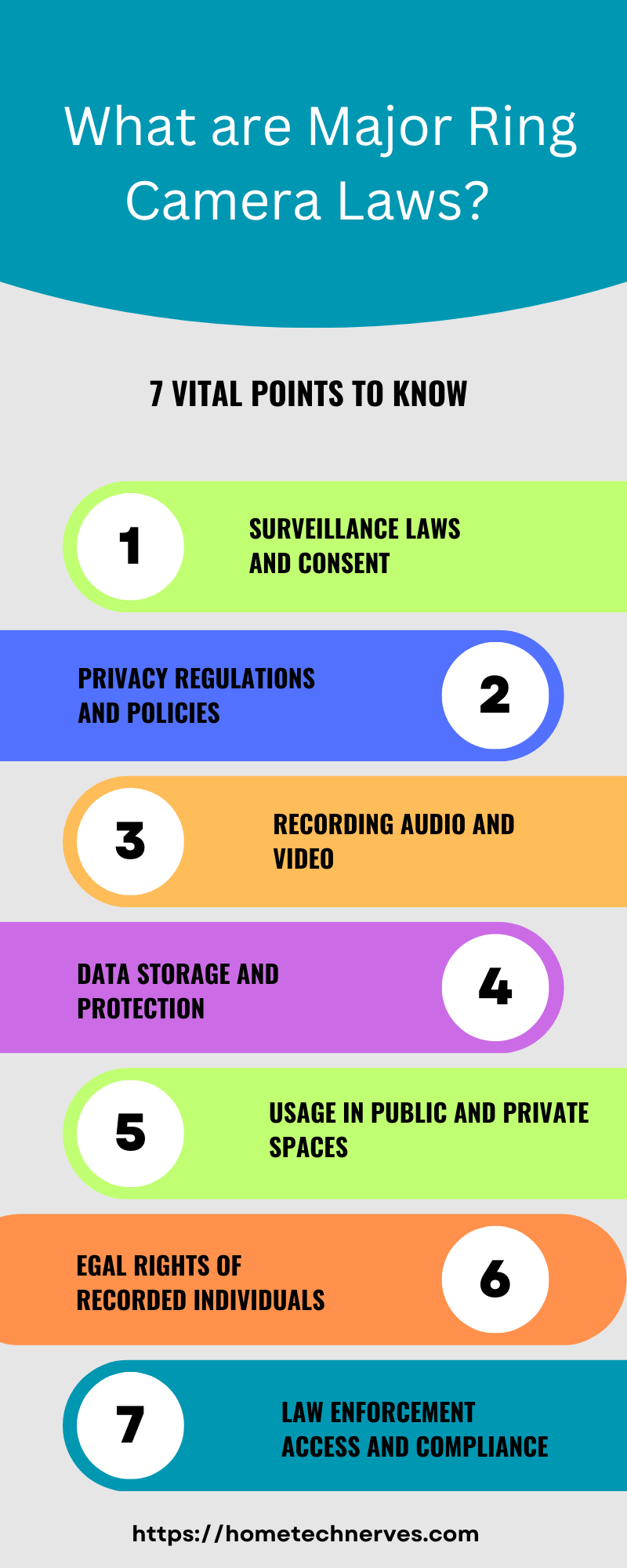As an experienced legal professional, I have frequently encountered inquiries about the admissibility of Ring camera footage in court proceedings.
With the widespread adoption of this technology, the question of its evidentiary value has become increasingly pertinent.
In my practice, I have witnessed how Ring camera videos can serve as crucial evidence in a variety of cases, including theft, vandalism, and even violent crimes.
However, it’s essential to understand the legal nuances surrounding its admissibility, including issues related to authentication, privacy concerns, and potential objections.
In this article, I’ll delve into the query “Can Ring camera video be used in court?” Clarifying the intricacies is paramount to leveraging Ring camera footage effectively in the courtroom.
Read more: Home Security Systems
Table of Contents
How Can Ring Camera Video Be Used in Court?
Home security camera footage has become a vital tool in modern-day legal proceedings, providing crucial evidence in various cases. Understanding how this footage can be effectively utilized in court is essential for building strong legal arguments and presenting compelling evidence.
Here are a few ways:
- Establishing the sequence: Providing a clear timeline of events captured by the home security camera footage can help establish the sequence of actions leading up to the incident in question.
- Identifying perpetrators: Using the footage to identify individuals involved in criminal activities, such as burglaries or vandalism, can significantly strengthen the case and aid in the apprehension of the perpetrators.
- Verifying testimonies: Home security camera footage can serve as valuable corroborative evidence, supporting witness testimonies and adding credibility to the presented accounts.
- Proving negligence: In cases involving accidents or property damage, the footage can be instrumental in demonstrating negligence on the part of an individual or an organization, aiding in the determination of liability.
- Disproving false claims: Home security camera footage can be crucial in refuting false claims or accusations, providing an objective account of the events, and effectively countering baseless allegations.
Can Ring Doorbell be Used as CCTV?
The Ring doorbell is primarily designed as a smart doorbell, equipped with a camera to allow users to see and communicate with visitors remotely via a smartphone or other compatible device.
While it can capture video footage of the area around the door, it is not typically considered a full-fledged CCTV (closed-circuit television) system.
Traditional CCTV systems often have more extensive capabilities, such as multiple cameras, larger storage capacity, and more sophisticated monitoring features.
However, depending on the specific model and any additional features it may have, the Ring doorbell can provide a basic level of surveillance for the immediate vicinity of the door.
Can I Block My Neighbor’s Ring Doorbell?
Intentionally blocking your neighbor’s Ring doorbell or any other security device is generally not advisable, as it could potentially lead to legal issues and conflicts.
Deliberate interference with someone else’s security system can be considered a violation of privacy and may constitute a legal offense, depending on the specific laws in your area.
If you have concerns about your neighbor’s Ring doorbell, it is recommended to address the issue through open communication and respectful dialogue.
Alternatively, if you believe there is a legitimate reason for your concern, you may consult local authorities or legal professionals to discuss your options within the boundaries of the law.
Are Ring Doorbells Legal in Apartments?
The legality of installing Ring doorbells or any other similar devices in apartments can depend on various factors, including the specific regulations set by the apartment complex, the landlord’s policies, and the laws in your region.
Some apartment complexes may have restrictions or guidelines regarding the installation of security devices or modifications to the property, including doorbells with cameras.
It is advisable to review the terms of the lease agreement and consult with the landlord or property management to ensure compliance with any rules or regulations.
Additionally, familiarizing yourself with the local privacy laws and guidelines related to surveillance devices can provide clarity on the permissible use of such technology in apartments.
Major Ring Camera Laws
Understanding the legal implications and regulations surrounding the use of Ring cameras is crucial in maintaining privacy and adhering to the law. Whether for personal or commercial use, being aware of the legal framework ensures responsible deployment of this technology.
Here are a few major Ring camera laws:
- Consent requirements: Ring camera laws often mandate obtaining explicit consent from individuals before recording their activities in private or public spaces.
- Public vs. private spaces: Different jurisdictions may have specific laws differentiating the use of Ring cameras in public areas versus private properties.
- Data protection obligations: Ring camera laws may include provisions to safeguard the recorded data and ensure it is not misused or unlawfully accessed.
- Notification obligations: Some laws may require the conspicuous display of notices or signs indicating the presence of surveillance devices like Ring cameras.
- Prohibited locations: Certain laws may prohibit the use of Ring cameras in sensitive areas such as bathrooms, changing rooms, or other spaces where a reasonable expectation of privacy exists.
- Audio recording regulations: Laws governing Ring cameras often include provisions on the use of audio recording features, including restrictions on capturing conversations without consent.
- Video retention policies: Some jurisdictions may enforce specific time limits for retaining recorded video footage to prevent unwarranted invasion of privacy or misuse of data.
- Law enforcement cooperation: Understanding the extent to which law enforcement can access Ring camera footage and the protocols for such access is vital in complying with legal requirements and protecting individual rights.

Can I Share the Ring Doorbell Footage?
Sharing Ring doorbell footage should be approached with caution to ensure compliance with privacy laws and regulations.
Before sharing any footage, it is essential to obtain consent from all individuals captured in the recording, especially if the footage includes sensitive or personally identifiable information.
Consider the implications of sharing the footage, as unauthorized dissemination may violate privacy rights and lead to legal consequences.
To maintain transparency and ethical standards, inform individuals about the purpose and scope of the sharing, and limit the distribution of the footage to only those with a legitimate need to access it, such as law enforcement authorities or legal representatives.
Do You Need Permission to Have a Ring Doorbell?
The requirement for permission to install a Ring doorbell can depend on several factors, including local regulations, homeowner association rules, and specific laws in your region.
In some areas, there may be no explicit requirement for permission to install a Ring doorbell on private property. However, it is advisable to review any relevant homeowner association guidelines or lease agreements, as they may contain provisions related to the installation of security devices.
Additionally, considering the privacy implications of surveillance technology, it is important to be mindful of any legal obligations regarding the recording of individuals on your property and to respect their privacy rights.
Wrap Up
In my experience, I have seen how Ring camera footage can significantly impact the outcomes of legal proceedings. However, it’s crucial to understand the intricacies of its admissibility to ensure its effective utilization in court.
With proper authentication, respect for privacy rights, and adherence to legal requirements, Ring camera video can serve as compelling evidence, bolstering the credibility of testimonies and providing valuable insights into the sequence of events.
By navigating the legal nuances with diligence and ethical considerations, we can leverage this technology to strengthen the pursuit of justice and truth in the courtroom.
Frequently Asked Questions
Can Ring camera footage be used in court?
Yes, Ring camera footage can be used in court as evidence if it is relevant to the case. It must be properly authenticated and meet legal standards for admissibility. Consult with a legal expert for specific guidance.
What are the legal requirements for using Ring footage in court?
For Ring footage to be used in court, it must be authentic, unaltered, and relevant to the case. Proper documentation of the chain of custody and evidence handling is crucial to ensure it meets legal standards.
Can Ring camera video be considered as evidence in criminal cases?
Yes, Ring camera video can be considered evidence in criminal cases. It can help provide valuable information, but its admissibility depends on its authenticity and relevance to the case. Legal procedures for evidence handling must be followed.
How do I ensure my Ring camera footage is admissible in court?
To ensure Ring camera footage is admissible, preserve it in its original format, avoid tampering, and document its chain of custody. Consult with a legal professional to ensure compliance with local evidence rules and standards.


